Is Sweden's feminist agenda working?
- Published
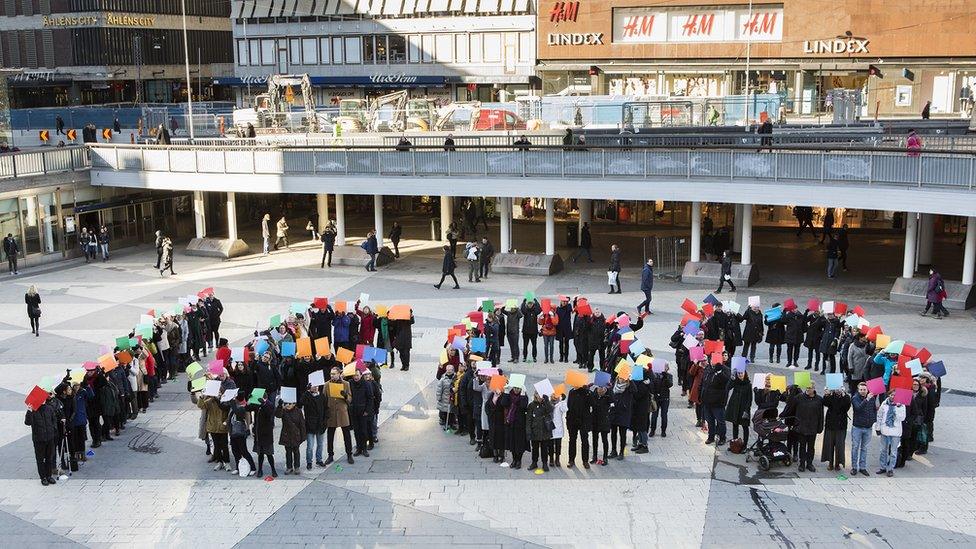
Swedish women held a protest to highlight the pay gap between men and women
"The first feminist government in the world" - that is how the Swedish government describes itself. So how is that feminist agenda taking effect?
David Crouch, a journalist and media lecturer based in Sweden's second city Gothenburg, investigates.
Dozens of women lined up in Stockholm's central square to form the figure 1600 on 15 February.
Representing women's organisations, political parties and trade unions, they wanted to highlight the pay gap between men and women in Sweden, as a result of which women effectively work their final hour, after 16:00, for free.
"Gender equality is about shifting power, and it takes time. But even I am impatient," Equality Minister Asa Regner told the event.
Since this annual protest began five years ago, the calculation of women's unpaid daily working time - relative to men's pay - has ticked forward from 1551.
Things are getting better for women under the "feminist government", external, declared when a centre-left coalition of Social Democrats and Greens took power in 2014. But there is still a long way to go, critics say.
Bold gestures
Feminism in Sweden is not so politically charged as in some other European countries or in the US. Only one political party does not include feminism in its programme - the far-right Sweden Democrats - while of the four centre-right opposition parties, three are led by women.
The government's outspoken stance on feminism has made headlines internationally, after some eye-catching foreign policy gestures.
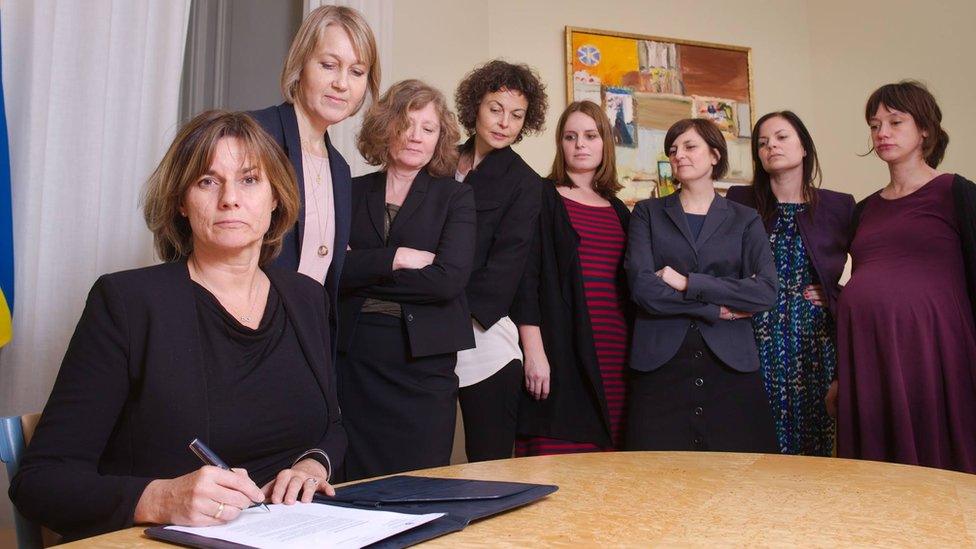
This photo of Swedish Climate Minister Isabella Lovin appeared to mock the male-dominated Trump team
Sweden's Foreign Minister, Margot Wallstrom, caused a diplomatic crisis in 2015 after Arab countries blocked a speech on women's rights that she wanted to deliver in Cairo. She had described Saudi Arabia's attitude to human rights as "medieval".
Earlier this month, Stockholm joined Denmark, Finland, Belgium, the Netherlands and Luxembourg in pledging to raise $600m (£483m), external to replace money withdrawn by US President Donald Trump, when he banned funding for groups that support abortion.
Then Sweden's Deputy Prime Minister, Isabella Lovin, became a viral sensation after she was photographed surrounded by women members of the government, in what appeared to be a parody of Mr Trump signing the anti-abortion measure.
Headscarf controversy
Some headlines have been less flattering to the government, however. This week, it received widespread condemnation after a trade visit to Iran, for instructing female officials to comply with Iran's headscarf law.
Last year, a report by a coalition, external of civil society and women's organisations condemned Sweden's continuing arms exports to countries that violate women's rights. That was "totally incompatible" with a feminist foreign policy, it said, as was the government's policy ending the right of family reunification for refugees, hitting women and girls left behind in war-torn countries.
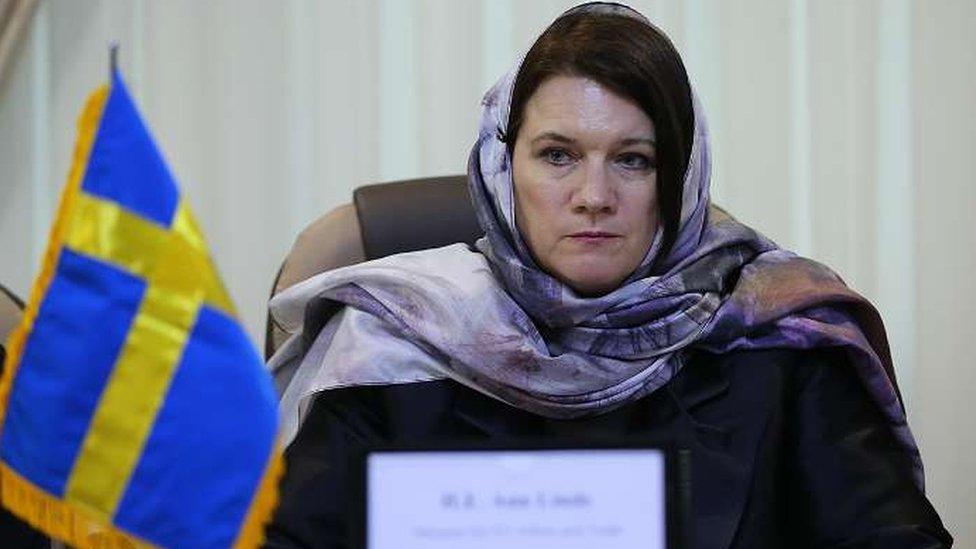
Trade Minister Ann Linde led a business delegation to Iran last week
During most of the past century, the Nordic countries have been dominated by centre-left Social Democrats who championed women's rights. But there have been big changes in recent years.
The governments of Finland and Norway are coalitions with nationalist parties, while the minority administration in Denmark depends on support from the far right.
These administrations are more sceptical about liberal or feminist ideas, and are more conservative on issues such as the family. Feminists in Sweden therefore feel that this puts more responsibility on Stockholm to stand up for women's rights.
And despite Sweden's image abroad as an egalitarian society where women enjoy high status, there are still marked inequalities.
The country leads the industrialised world in terms of public sector gender equality, according to the Organisation for Economic Co-operation and Development (OECD).
However, in the private sector, which has expanded greatly in recent years, men still make up more than 80% of management and 94% of top bosses. In newspaper boardrooms there are three men for every woman, while men make up 70% of the voices heard in the media.
In 2014, 75% of university professors were men.
And in the streets, many also feel the benefits are not immediately obvious. "The government saying it is feminist is a very good statement," says Matilda Andersson, 24, a hairdresser in Gothenburg.
"But I haven't noticed that anything has really changed in my life. Actually I feel a little less safe on the streets than a few years ago - and it's not the women I am afraid of."
Ms Andersson works in an industry dominated by women workers, but she says almost all the "celebrity" hairdressers in the media are men.
National headlines, external were made last month when a maternity ward was closed at a local hospital in a small northern town, meaning women would have to drive up to 100km (62 miles) to give birth.
"So now they are training women to give birth in their cars," she says. "That wouldn't happen if men had to give birth."
Work to be done
Sweden is famous for its generous parental leave provisions, allowing parents a total of almost 18 months off work, most of it on 80% of full pay.
However, women still take the lion's share (75%) of paid parental leave. And of those forced to work part-time due to caring for a child or adult relative, almost nine out of 10 are women.
Both the Social Democrats and Greens say they want to divide the parental leave equally among women and men, and recently they increased the time reserved for the father, or "daddy months", from two to three.
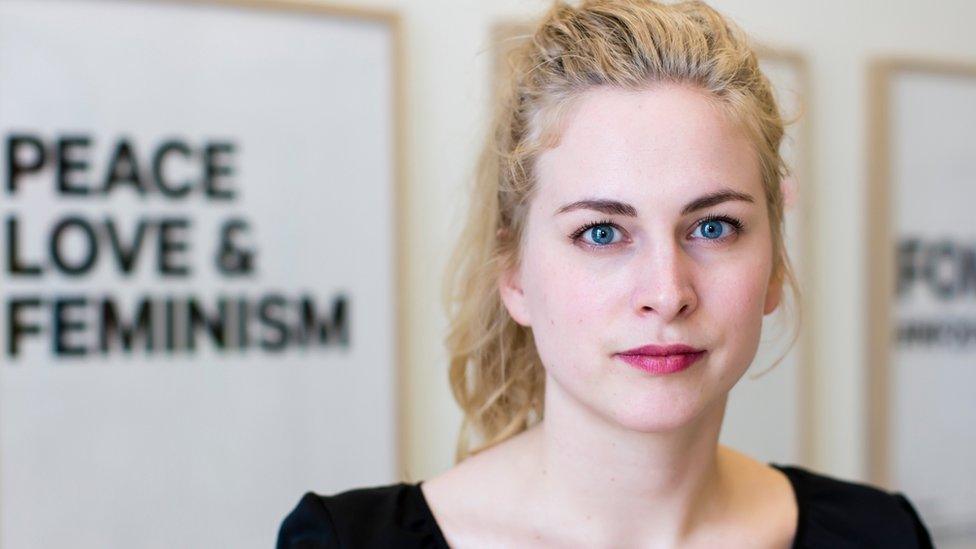
Lobbyist Clara Berglund wants much more government action on women's rights
"That is a good thing and it will have an effect," says Clara Berglund, leader of the Swedish Women's Lobby, an umbrella organisation for women's rights. "But if you are a feminist government, why not have the courage to go all the way?"
Ms Berglund is also unhappy that the government recently scrapped plans to introduce quotas for the number of women on the boards of listed companies.
And she says it has been slow to move against sexist advertising, despite pre-election promises. She points instead to London Mayor Sadiq Khan's ban last year on "body shaming" ads in the underground.
"Sweden is the only Nordic country not to have legislation against sexist ads," she says. "If it can be done in London, there can be no excuse for a feminist government not to move forward on this."
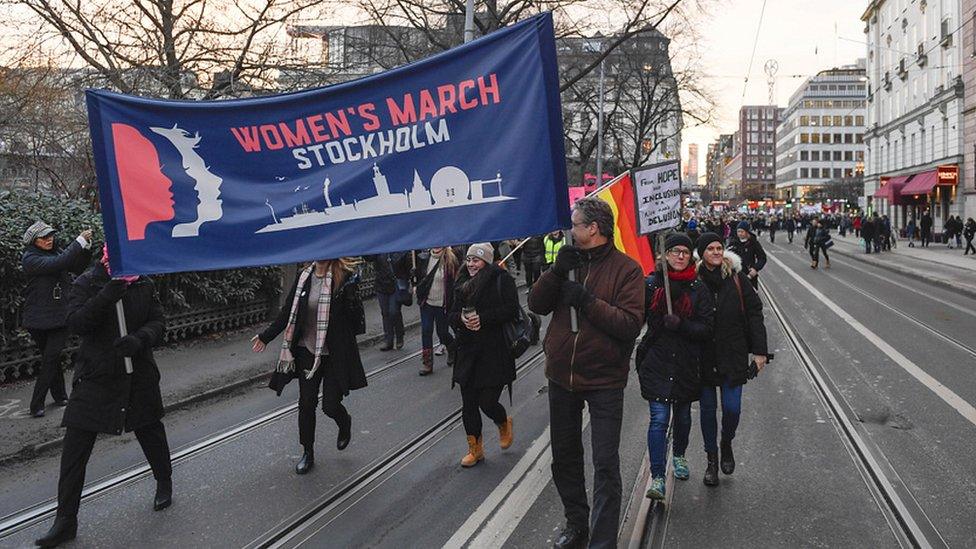
A Women's March was held in Stockholm after Donald Trump was elected US president
Despite her criticism, however, Ms Berglund believes that, with conservative movements on the rise in many Western countries, Sweden must identify itself as feminist - even if it is hard for the government to live up to high expectations.
"They have made some changes that are important for gender equality," she says. "But we have great expectations from the women's movement. A feminist government should have the courage to implement unpopular reforms."
- Published13 February 2017

- Published3 February 2017
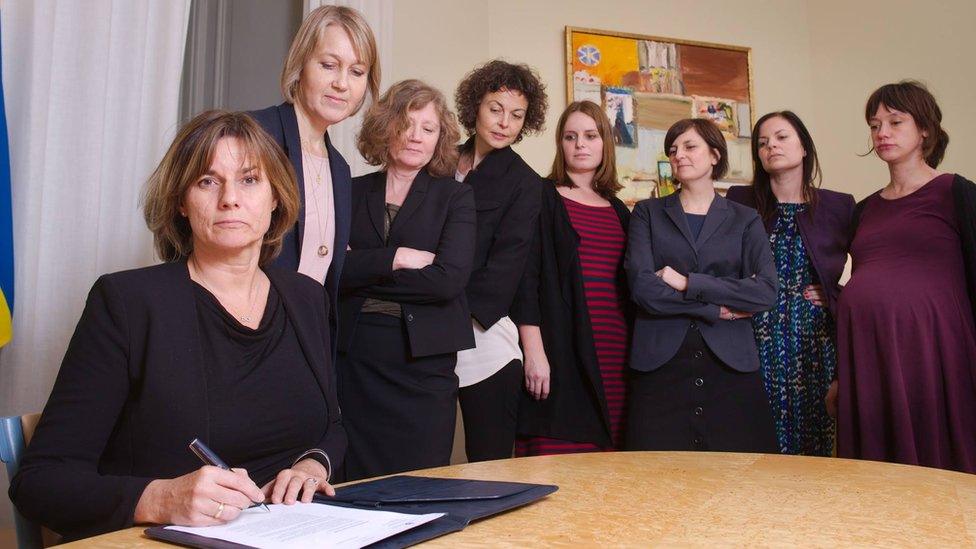
- Published29 March 2023
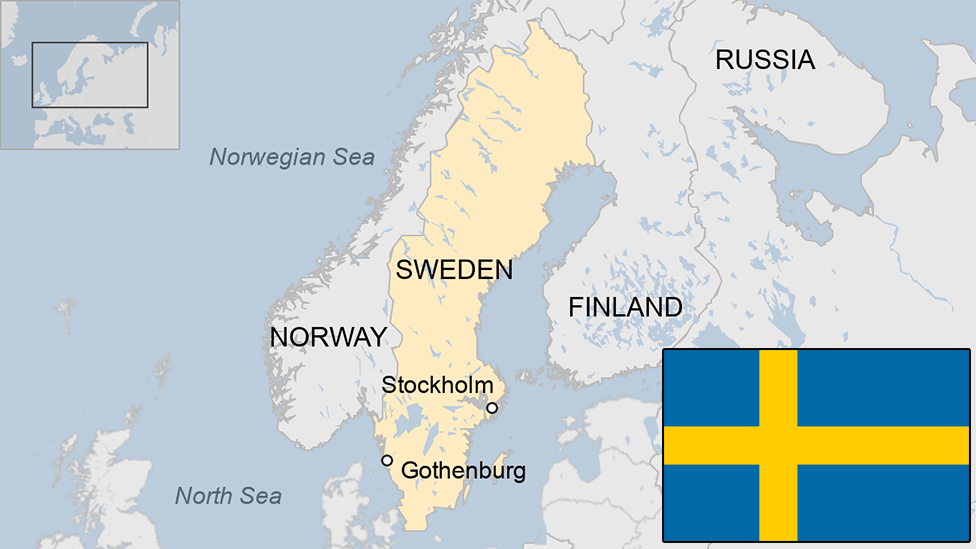
- Published30 November 2016
- Published6 January 2016

- Published7 December 2016
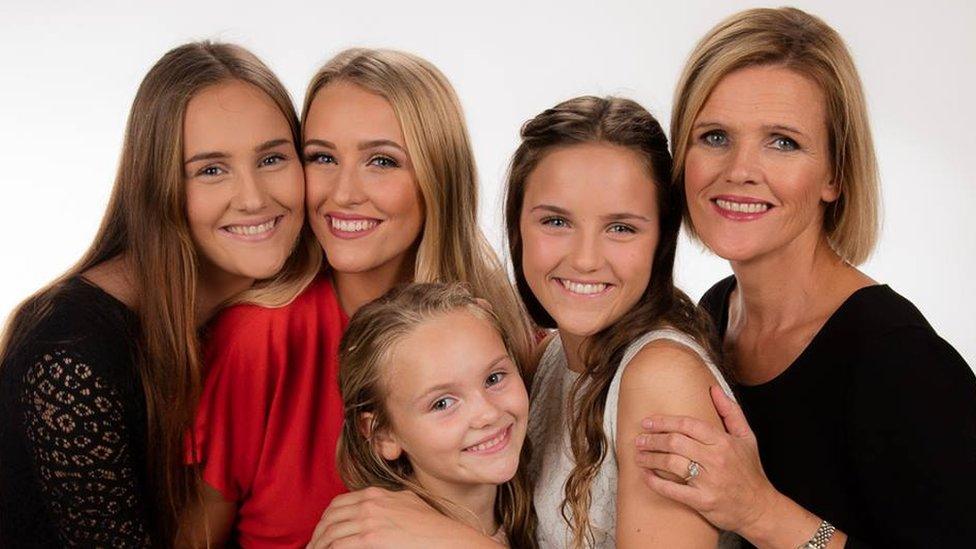
- Published31 May 2018
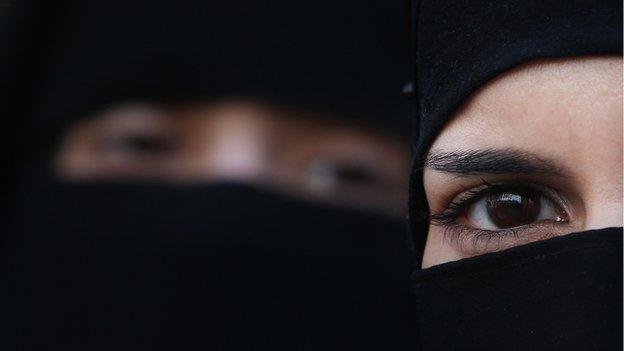
- Published28 November 2016
